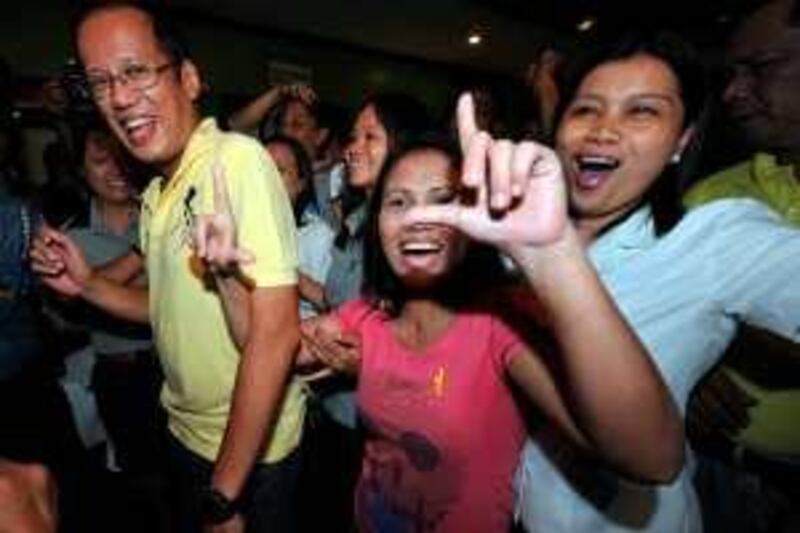MANILA // With senator Benigno "Noynoy" Aquino poised to become the next president of the Philippines, many Filipinos are starting to wonder whether the country's first automated elections will usher in a new dawn in the country's tainted political system. Political analysts are saying that while the mechanics of voting have changed for the better, the substance of the Philippine political system remains the same.
A quick look at the electoral map of the country shows the same family names appearing year after year, with many holding power for generations through intimidation and violence, such as in the case of the Ampatuan clan in Maguindanao on the southern island of Mindanao. The clan, which has ruled the province for more than 10 years, was allegedly behind the massacre of 57 people, including 32 journalists, last November. The politically motivated attack was aimed at the convoy to try to stop a political rival from being registered for Monday's election.
At least 12 members of the Ampatuan family contested Monday's election and won, including Bai Reshal Santiago Ampatuan, the wife of the prime suspect in the killings, Andal Ampatuan Jr. She was elected mayor of Datu Unsay town. Clarita Carlos, a political science professor at the University of the Philippines, said: "The mechanics of our electoral system have changed, and changed quite dramatically, but the substance of our political system has not ? the same families pop up all the time.
"Automation has sped up the voting process and time it takes to count the votes. Votes are now counted within hours of the polls closing rather than weeks under the old manual system," she said. "At the same time it has made cheating a lot harder. "Sadly, however, it has not changed the substance of our political system. You see the same old names, the same elite families, simply rotating election after election."
A foreign diplomat who was an observer for Monday's poll said he was "very surprised" at how well the election had gone. The diplomat, who declined to be named, said: "From the very start of the automated process it was fraught with trouble. Questions were asked about the time frame and whether there would be a collapse of the system on election day itself. "While some of these fears were quite justified, on the day the election did not fail. In fact it was better, despite some problems, than most people had first anticipated, not to mention the logistics and back up support needed to cover 75,000 polling stations in a country made up of 7,000 islands."
Of the 76,000 voting machines, 400 broke down but most of them were repaired before polling stations closed. Pete Troilo, director of the Manila-based economic and political risk consultancy Pacific Strategies & Assessments, said the vote had established "a new electoral benchmark for the Philippines". However, he said: "It remains to be seen, however, whether this election will actually result in the institutionalisation of a more credible elections process or a more rigorous dedication to democracy across government."
On polling day, more than 250,000 troops and police had fanned out across the country focusing on the so-called traditional "hot spots" known for electoral violence. Although 12 people were killed and dozens of violent incidents reported, Monday's vote was one of the most peaceful on record, according to police and the military. Rumours of destabilisation plots, widely reported in the media, proved to be unfounded.
Outgoing president, Gloria Macapagal Arroyo, announced yesterday she had put in place a transitional team to enable a "smooth transition to power". Mrs Arroyo, who steps down at midnight on June 30, is expected to win a congressional seat in her home district of Pampanga. Senator Manuel Villar conceded defeat 24 hours after the polls closed along with other presidential hopefuls, former defence secretary Gilbert Teodoro and senator Richard Gordon who all pledged to work with the new administration. Usually in Philippine elections no one concedes defeat, they usually claim they were cheated.
The exception was the former disgraced president Joseph "Erap" Estrada, who trailed Mr Aquino in the count and who refuses to give up, saying yesterday he would challenge an Aquino victory in the Congress. Marvin Tort, director of the Manila-based political and economic consultancy Think Tank, said: "As long as candidates and voters accept the validity of the tally, then expect greater public acceptance and appreciation for the new system.
"This will make it easier for the next government to justify additional spending on poll automation for the 2013 mid-term elections. There is no turning back. Automation, hopefully, isthe start of better things," he said. He agreed with Prof Carlos that the mechanics had changed the way people voted, but the substance of Philippine politics had not. "You will also see a shift from the outgoing government's political bloc in Congress - Lakas Campi Christian Muslim Democrats to Aquino's Liberal Party," he said. "Unlike in other democracies there is no such thing as party loyalty. Politicians go whichever way the political wind blows."
@Email:foreign.desk@thenational.ae





